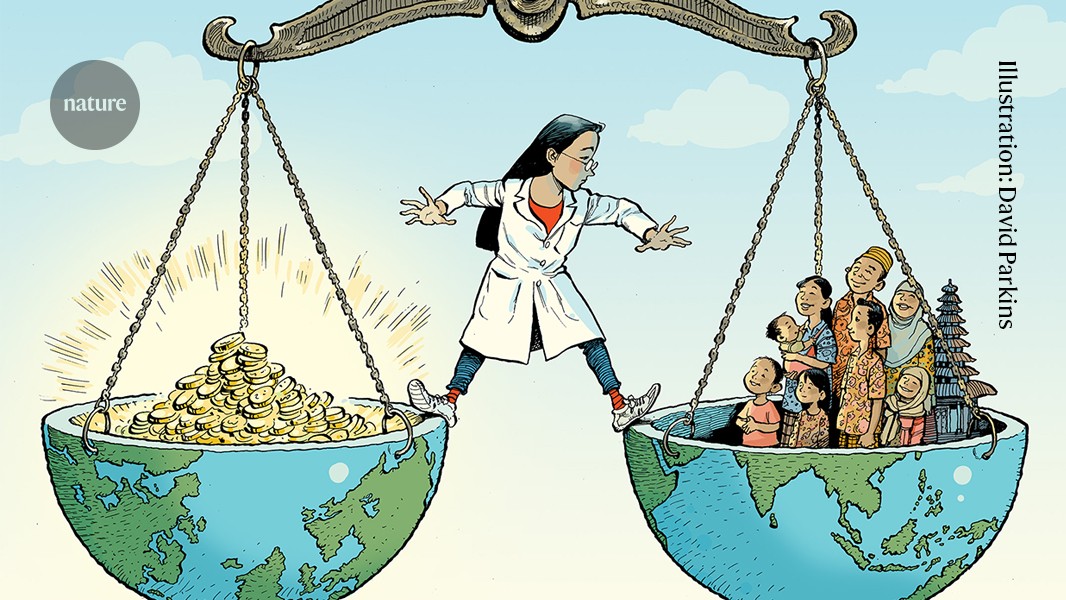Should I return to my home country after my PhD abroad?

A graduate student from southeast Asia, now based in a European country and missing her homeland, agonizes over her next career move
The problem
Dear Nature,
I am a final-year PhD student in Finland with a supportive PhD supervisor and a well-resourced laboratory. I’m thinking of applying for an academic job here, but I’m often homesick: I miss my family in southeast Asia and my mother’s cooking. I feel my career would be more meaningful if I returned to apply my knowledge in my own community, where there are many problems that science can help to solve. But can my home country’s university provide a better working environment than the one I have here, with a decent salary and significant research funding?
I feel I must choose between a career in the well-resourced global north and a career with more profound connections to my lower-income homeland. How can I make this decision? — A homesick PhD student
The advice
First, you are far from alone. Your story will resonate with thousands of scientists from low- and middle-income countries who are studying in the Northern Hemisphere. It is natural to feel conflicted, but, in the end, everybody must choose a path.
Nature’s Careers team spoke to three researchers who have already made this difficult decision. They all agree that, no matter where you end up, you can still work towards building capacity, bolstering research infrastructure and mentoring early-career scientists in your home country. At the same time, you can expand your international scientific network to nurture your career in any country.
Returning to your roots
Dimas Dwi Laksmana, a chemist turned sociologist at the University of Indonesia in Jakarta, decided to return home in 2021 after completing a PhD in sociology in Germany. He describes seeing a “a power imbalance” during his studies, whereby scientists from wealthy countries visit lower-income ones for short-term research projects and publish their findings — perhaps hoping that their published papers will become policy recommendations for countries in the global south. But “the reality is not that simple”, he says. Even with sometimes large investments, this sort of ‘parachute science’ does not have a lasting impact on the local communities, he says, often because the researchers are culturally detached from them. Doing a PhD project on organic farming in rural Yogyakarta, Indonesia, helped to convince him to return to the country permanently, he says.
Laksmana says he returned to be part of the movement to decolonize science — that is, to undo the marginalization and erasure of local and traditional knowledge that colonialism, racism and parachute science have triggered in global research. “I can contribute more by being a university lecturer in my home country.”
In a paper published by Nature Ecology & Evolution (T. Rivera-Núñez et al. Nature Ecol. Evol. 8, 1559–1560; 2024), a group of early-career researchers from Mexico highlight the benefits of south–south collaborations between locally based researchers and communities. But they also point out some potential downsides: academic job scarcity, administrative burdens and intense pressures from local universities to publish as many papers as possible. These drawbacks can hamper efforts to produce high-quality research in their home country, they write.
Laksmana anticipated this. So, in addition to researching academic jobs in Indonesia and their salary ranges, he looked into the levels of administrative bureaucracy that would be involved. He advises you to do this homework, ideally before your final PhD year. This will help you to set realistic expectations and prepare you for the transition in research culture that a move to your home country would entail.
Keep your current connections
Returning home could be challenging for scientists from low-resource nations who have spent years in countries with advanced technologies and higher salaries, says Daniel Zhigila, a botanist at Gombe State University in Gombe, Nigeria. For example, the basic salary for a university lecturer is the equivalent of US$170–380 per month in Indonesia, $120–580 in Vietnam and $160–460 in Nigeria. In Indonesia, this might stretch to as much as $800 per month when combined with other forms of remuneration, such as teaching and administrative pay.
University research funding in low- and middle-income countries is also often severely limited. In Indonesia, the government allocated $72 million of research funding for its 303,000 university lecturers in 2024. An annual funding scheme allows early-career lecturers to earn small grants of up to $3,000 for a 7-month research project. Many say that these financial limitations prevent them from doing high-quality research. In Nigeria, the situation is similar. The federal government approved just $3.3 million for the country’s research in 2025. Moreover, bureaucratic red tape complicates researchers’ access to these funds, says Zhigila.
But Zhigila stresses that low funding levels shouldn’t mean an automatic ‘no’ to returning home. One way to mitigate these problems, Zhigila says, is to stay connected with well-resourced global-north scientists, proactively building a network to ensure collaboration opportunities. Such a network helps scientists to continue working on their research interests and develop an international portfolio. “The globe is becoming a village,” he says. In 2024, Zhigila secured a fellowship at Harvard University’s Arnold Arboretum in Boston, Massachusetts, to do genomic analysis of African plant samples, an opportunity that he found online. His work there will add African-based knowledge to the Western-dominated field of botany. Such collaborations not only support scientists’ individual careers but also connect institutions across borders.
Enjoying our latest content?
Login or create an account to continue
- Access the most recent journalism from Nature's award-winning team
- Explore the latest features & opinion covering groundbreaking research
or
Sign in or create an account Continue with Google
Continue with Google
Nature 640, 847-848 (2025)
doi: https://doi.org/10.1038/d41586-025-01147-3
This article is part of a series in Nature in which we share advice on career issues faced by readers. Have a problem? E-mail us at [email protected]
This story originally appeared on: Nature - Author:Dyna Rochmyaningsih
















